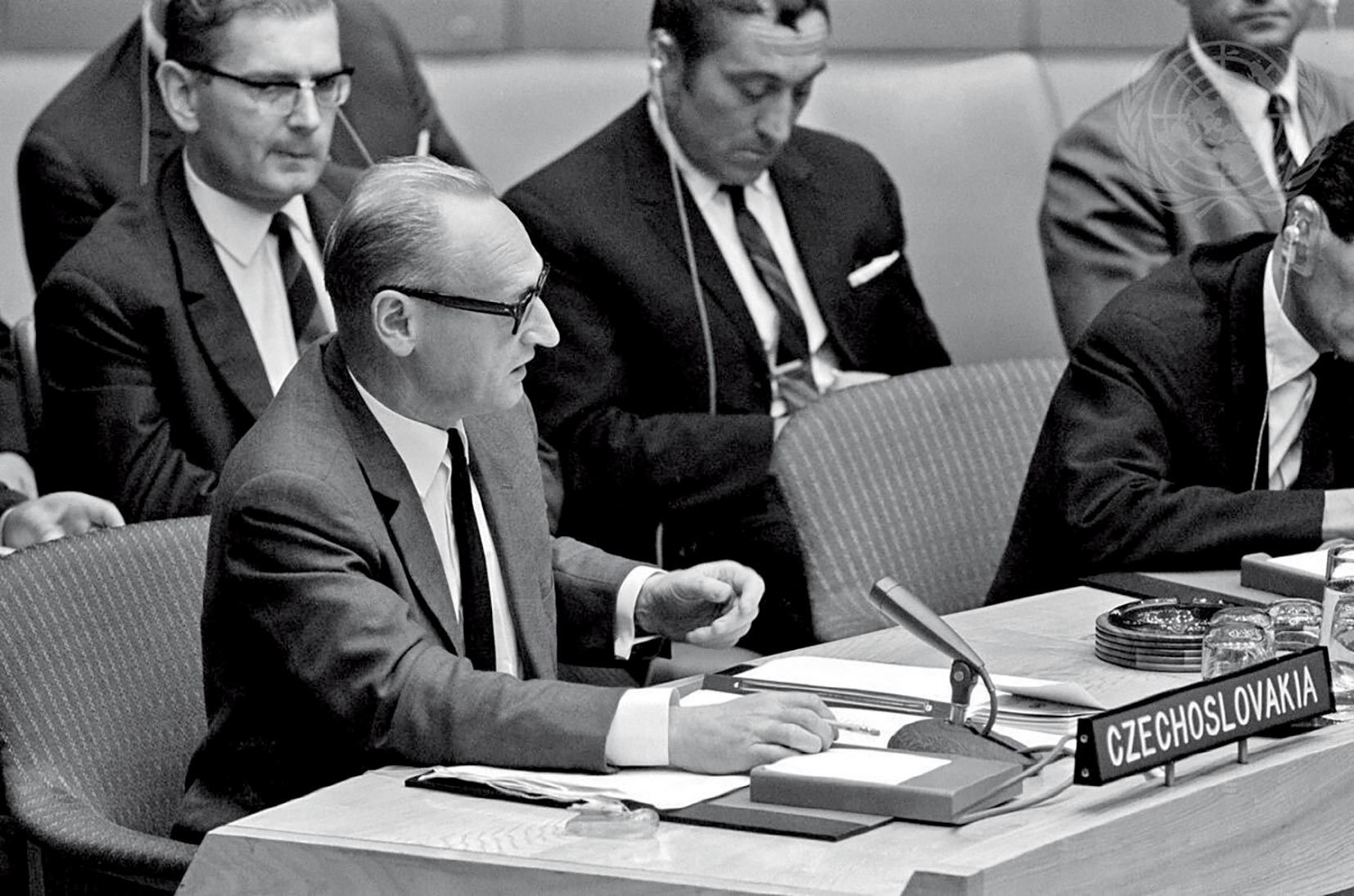The lawyer, diplomat, and politician Jiří Hájek, the 110th anniversary of whose birth and 30th anniversary of whose death we remember this year, is a notable figure of Czechoslovak political history. He fought against totalitarian regimes of the 20th century, defended human rights, and was one of the signatories of Charter 77.
Despite holding a high political office before 1968, he was one of the most prominent defenders of human rights in the 1970s, becoming one of the main faces of the opposition against the totalitarian regime during the normalization era.
Active against fascism
Hájek was already openly opposed to fascism during his studies at the Charles University Faculty of Law and gradually became a member of various illegal organizations. Following the occupation of Czechia and Moravia by the nazis, he worked in the left-leaning illegal newspaper called Information Service of National Liberation. The paper was openly aligned with the Western resistance and with Eduard Beneš, reporting news from the Protectorate but also information about the situation in Slovakia and abroad. Thanks to Jiří Hájek, the paper was connected with the leftist Union of Working Youth, which they saw as the National Labor Party's juvenile hub. Prior to the war, Hájek was a member of the social democracy. He would go on to work as a diplomat in the United Kingdom, deputy minister of foreign affairs, permanent representative of Czechoslovakia to the UN, and minister of foreign affairs. But he also held the seat of minister of education and culture.
Fateful year 1968
Since the beginning of 1968, a storm was brewing around Czechoslovakia in the form of armies of the Warsaw Pact. A select few high-ranking members of the Czechoslovak brass knew what was going to happen but the political higher-ups didn't believe that the armies were up to something and refused to accept that a military intervention was possible. From his position as minister of foreign affairs, Jiří Hájek tried to warn the secretary general of the Communist Party at the time, Alexander Dubček, outlining different possible developments and even organizing a meeting between several ministers and generals in July 1968. They agreed that the odds of successfully defending the country were minimal. Perhaps Dubček and his inner circle didn't take the warnings seriously, despite there being more than enough signals to the contrary. Following the occupation of Czechoslovakia, Jiří Hájek denied any notion of the armies being invited and condemned the invasion in a UN Security Council meeting on August 24, 1968. However, three days later, the Czech delegation changed its stance and asked for the topic to be removed from the agenda.
Fight against totalitarianism
The informal civic initiative Charter 77 was founded in December 1976. It called attention to the breach of human and political rights in Czechoslovakia and pleaded the Final Act of the Conference on Security and Cooperation in Europe. The text of Charter 77 was written by Václav Havel and Pavel Kohout, and the document was signed by 242 people shortly after its release. Together with Václav Havel, Jiří Hájek was one of the first spokespeople of the Charter 77 movement. Nearly 2000 people signed the manifesto throughout the era of communism. Some of the Slovak signatories were historian Ján Mlynárik, political scientist Miroslav Kusý, and writers Dominik Tatarka and Ľudovít Didi. Many signatories were persecuted and imprisoned by the regime.
An award withheld
Jiří Hájek was set to receive a state award in 2013 in memoriam. It was supposed to be accepted on his behalf by his son but he refused to participate in the ceremony because of his disapproval of the then President Miloš Zeman's policy. President Zeman decreed that the request of Mr. Hájek to have the state award for his father delivered by mail or courier showed insufficient respect for the institution and so refused to award Jiří Hájek the commendation.
CV BOX
Jiří Hájek (born June 6, 1913, in Krhanice close to Benešov) was a politician and diplomat, minister of education in the 1960s, and minister of foreign affairs. He was a speaker for Charter 77 during the normalization era.
He graduated in law from Charles University. After March 1939, he worked illegally for the Union of Working Youth and was arrested in November 1939 and sentenced to prison.
He joined ČSSD right after the war. He was a member of the Interim National Assembly and played a role in the fusion between the social democratic party and the communist party.
In August 1968, as the minister of foreign affairs, he protested against the Soviet invasion of the CSSR in a UN Security Council meeting.
Following his removal from office and departure from the communist party, he worked as a researcher at the CSAS Institute of History in Prague. After 1989, he was an advisor to Alexander Dubček.
He is one of the founding members of the Czechoslovak Helsinki Committee.
Hájek died on October 22, 1993, in Prague.
.jpg)
Jiří Hájek was the first laureate of the Thorolf Rafto Memorial Award presented by the Norwegian foundation Raftostiftelsen.

Jiří Hájek at a UN Security Council meeting in 1968.